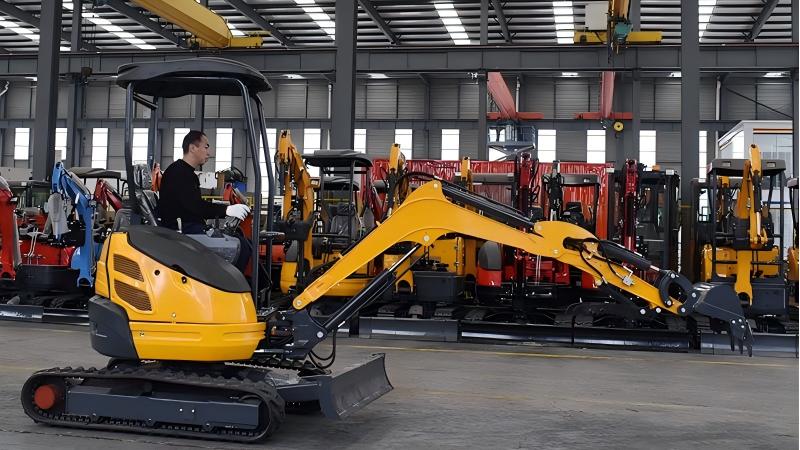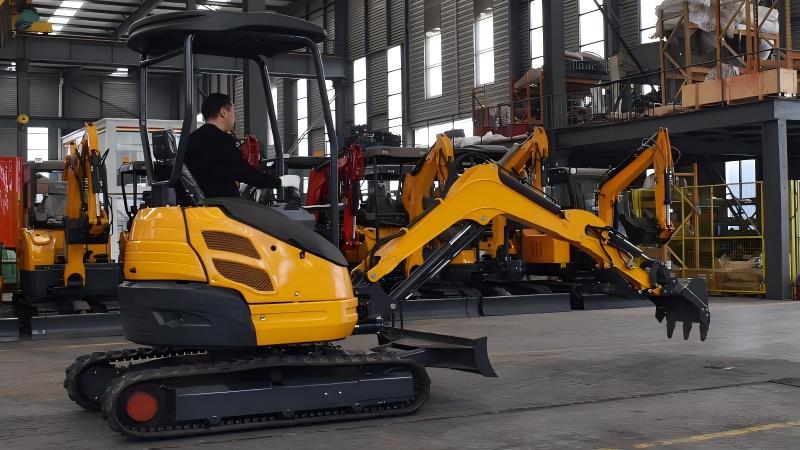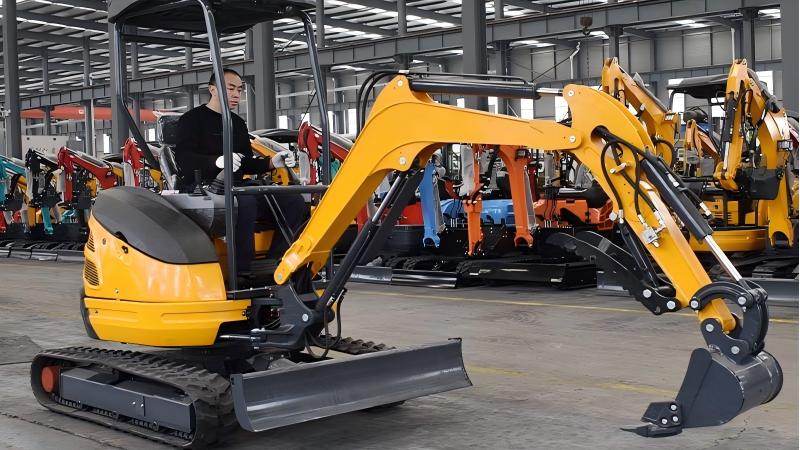Understanding Excavator Fuel Consumption
Before exploring reduction strategies, it's crucial to understand what drives an excavator's fuel consumption. The primary factors include:
Engine Load: Higher engine loads, such as during heavy digging or lifting, demand more power and thus more fuel.
Engine Speed (RPM): Operating at unnecessarily high RPMs, even under light loads, wastes fuel.
Hydraulic System Efficiency: Leaks, worn components, or improper settings in the hydraulic system can lead to energy loss and increased fuel consumption.
Idling Time: An idling engine consumes fuel without performing any work.
Operator Technique: Inefficient operating habits can drastically increase fuel usage.
Machine Condition and Maintenance: Poorly maintained engines, filters, and hydraulic systems operate inefficiently.
Workpiece and Ground Conditions: The type of material being excavated and the ground conditions directly impact the effort required and thus fuel consumption.
Attachment Selection: Using an oversized or undersized attachment for a task can lead to inefficiencies.
Strategies for Reducing Excavator Fuel Consumption
Reducing excavator fuel consumption requires a multi-faceted approach, combining best practices in operation, maintenance, and technology.
Optimize Operator Technique and Training:
The operator plays a pivotal role in fuel efficiency. Comprehensive training can yield significant reductions.
Smooth and Coordinated Movements: Jerky or uncoordinated movements increase stress on the hydraulic system and engine, leading to higher fuel consumption. Operators should be trained to perform smooth, fluid motions that minimize sudden accelerations and decelerations.
Minimize Idling: Unnecessary idling is a major fuel guzzler. Operators should be educated on the cost of idling and encouraged to shut down the engine during breaks, prolonged waiting periods, or when the machine is not actively working for more than a few minutes. Many modern excavators feature automatic engine shutdown systems that can be configured.
Proper Bucket Loading: Overfilling the bucket leads to excessive strain and reduced cycle times, while underfilling is inefficient. Operators should aim for optimal bucket fill factors, utilizing the machine's full capacity without overloading it.
Optimal Engine RPM: Operators should strive to operate the engine at the lowest possible RPM that still allows for efficient work. Many excavators have eco-modes or power modes that help in this regard. Using too high an RPM for a light load is wasteful.
Strategic Machine Positioning: Positioning the excavator optimally reduces the need for excessive slewing and tracking, saving both time and fuel. Planning the work area and material movement beforehand can make a substantial difference.
Utilize Gravity When Possible: When excavating or loading, operators should try to leverage gravity where feasible, for instance, by positioning dump trucks at a lower level than the excavation point.
Minimize Travel: Unnecessary travel around the job site consumes fuel. Efficient site planning and strategic machine placement can reduce travel distances.
Implement Regular and Proactive Maintenance:
A well-maintained excavator is an efficient excavator. Adhering to manufacturer-recommended maintenance schedules is paramount.
Engine Tuning and Filter Replacement: A properly tuned engine with clean air and fuel filters ensures optimal combustion and reduces fuel consumption. Clogged filters restrict airflow and fuel delivery, forcing the engine to work harder.
Air Filters: Regular cleaning or replacement of air filters is crucial as dust and debris can significantly reduce engine efficiency.
Fuel Filters: Contaminated fuel filters can restrict fuel flow, leading to performance issues and increased consumption.
Hydraulic System Health: The hydraulic system is the heart of an excavator's work.
Hydraulic Fluid Quality and Level: Ensure the hydraulic fluid is at the correct level and replaced according to specifications. Old or contaminated fluid can increase friction and reduce efficiency.
Inspect for Leaks: Even small hydraulic leaks can lead to significant energy loss and increased fuel consumption over time. Regular inspection and prompt repair of leaks are essential.
System Pressure and Flow Checks: Periodically verify that hydraulic system pressures and flow rates are within manufacturer specifications. Deviations can indicate component wear or maladjustment, leading to inefficiency.
Lubrication: Proper lubrication of all moving parts reduces friction and wear, allowing the machine to operate more smoothly and efficiently.
Track Tension: Incorrect track tension can increase rolling resistance, leading to higher fuel consumption and accelerated wear on undercarriage components.
Cooling System: An efficient cooling system prevents the engine from overheating, which can lead to reduced efficiency and potential damage.
Leverage Technology and Advanced Features:
Modern excavators are equipped with technologies designed to improve fuel efficiency.
Eco Modes and Power Modes: Most contemporary excavators feature "Eco" or "Economy" modes that optimize engine output and hydraulic flow for specific tasks, reducing fuel consumption without significantly compromising performance for lighter applications. "Power" modes are for heavy-duty work and should be used judiciously.
Automatic Engine Shutdown/Idle Management Systems: These systems automatically shut down the engine after a pre-set period of inactivity, eliminating unnecessary idling.
Telematics and GPS Systems: Telematics systems provide real-time data on machine performance, including fuel consumption, idling time, and operational efficiency. This data can be analyzed to identify inefficiencies, track operator performance, and pinpoint areas for improvement. GPS integration can also optimize travel routes and site logistics.
Variable Displacement Pumps: These pumps adjust their output based on demand, reducing energy waste compared to fixed displacement pumps that always operate at maximum flow.
Engine Technology: Modern engines with advanced electronic controls, common rail fuel injection, and exhaust gas recirculation (EGR) systems are inherently more fuel-efficient and produce fewer emissions.
Hybrid Excavators: For certain applications, hybrid excavators, which utilize electric motors and battery packs to assist the engine, can offer significant fuel savings, especially in repetitive digging cycles where regenerative braking can be employed.
Work Tool Optimization: Some excavators feature smart hydraulic systems that optimize flow and pressure to specific attachments, improving efficiency.
Strategic Job Planning and Site Management:
Efficient planning beyond the machine itself can contribute substantially to fuel reduction.
Site Layout Optimization: Design the job site to minimize travel distances for the excavator and supporting equipment. Proper placement of material stockpiles, dump trucks, and spoil areas can significantly reduce tracking and slewing.
Material Analysis: Understanding the material to be excavated (e.g., soil type, rock content) helps in selecting the right attachment and planning the most efficient digging strategy.
Matching Machine to Task: Using an excavator that is appropriately sized for the task at hand prevents over-exertion or under-utilization, both of which can be fuel-inefficient. Using an oversized machine for a light job or an undersized one for heavy work will lead to increased fuel consumption.
Proper Attachment Selection: Select the correct bucket size and type for the material. A well-matched bucket will allow for optimal fill and efficient digging. Using hydraulic breakers or rippers when necessary can reduce the need for excessive digging with the bucket in tough conditions.
Minimize Double Handling: Plan material movement to avoid moving the same material multiple times. Each movement consumes fuel.
Fuel Quality and Storage:
While often overlooked, the quality of fuel can impact engine performance and consumption.
Use High-Quality Fuel: Ensure the fuel meets recommended standards and is free from contaminants. Poor quality fuel can lead to incomplete combustion and reduced engine efficiency.
Proper Fuel Storage: Store fuel in clean, dry conditions to prevent contamination from water or particulates, which can damage fuel system components and reduce efficiency.
Conclusion
Reducing excavator fuel consumption is not a singular action but a holistic strategy involving technological adoption, rigorous maintenance, and most importantly, skilled and aware operators. By implementing these measures, companies can achieve substantial cost savings, extend the lifespan of their machinery, and contribute positively to environmental sustainability. The investment in operator training, advanced technology, and diligent maintenance will undoubtedly pay dividends in the long run, making excavation operations more economical and environmentally responsible.
Post time:Sep-25-2020



